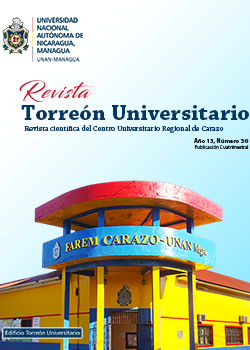Rol de la mediación pedagógica en el proceso de aprendizaje del español como lengua extranjera
DOI:
https://doi.org/10.5377/rtu.v13i38.19300Palabras clave:
Aprendizaje, estrategias, enseñanza del español como lengua extranjera, mediación pedagógica, aprendientesResumen
La mediación pedagógica como estrategia para el aprendizaje de enseñanza del Español como Lengua Extranjera ELE es una opción que favorece tanto al aprendiente como al profesor para que se lleve a cabo la efectiva adquisición. De ahí que en este artículo se presenta un breve análisis alrededor de la mediación pedagógica partiendo de elementos teórico-prácticos relacionados con el proceso de enseñanza-aprendizaje. El objetivo consistió en analizar la percepción de los actores principales del acto de enseñanza-aprendizaje sobre la importancia de la mediación pedagógica para lograr el alcance de las competencias y cumplir con los intereses de los aprendientes. La investigación se realizó mediante un enfoque cualitativo y se identificó una unidad de análisis mayor: mediación pedagógica como estrategia de enseñanza-aprendizaje. Del mismo modo unidades menores: la mediación pedagógica desde una visión centrada en el saber hacer y, la mediación pedagógica centrada en la actuación escolar y las vivencias pedagógicas en el seno de una educación centrada en el ser. Para el análisis de los datos se elaboró matriz de doble entrada. También, se aplicó triangulación de la información, considerando los objetivos, preguntas de investigación y unidades de análisis. En este artículo se presenta una descripción de elementos de algunas posturas de nivel conceptual que tienen los profesores y directores sobre el concepto de mediación pedagógica y su implicancia en el proceso de aprendizaje. Asimismo, se explica cómo los actores encargados de llevar el cabo la enseñanza, consideran en qué acciones escolares y vivencias se puede llevar a cabo el aprendizaje y su relación con los intereses de los aprendientes.
Descargas
Referencias
Hernández Sampieri, R., Fernández, C., & Baptista, F. (2014). Metodología de la Investigacion. Mexico: McGrawHil.
Lantolf, J., & Beckett, T. (2009). Sociocultural theory and second language acquisition.
Lawsy, K., & McLeod, R. (28 de noviembre de 2014). Case study and grounded theory: Sharing some alternative qualitative research methodology with systems professionals. 29, 12.
Madrid, D., Hockly, N., & Pueyo, S. (2010). Metodología de investigación en el aula de ELE. Funiber.
Maturana, H. (1998). Realidad: ¿Objetiva o construida? Guadalajara: Instituto Tecnológico y de Estudios Superiores de Occidente ITESO.
Piñuel, R., & Gaitán, C. (2010). Investigación, comunicación y universidad. Salamanca: Comunicación Social.
Solís, J. (2013). El análisis documental como eslabón para la recuperación de información y los servicios. Barcelona, España. http://www.monografias.com/
trabajos14/analisisdocum/analisisdocum.shtml
Tebar, L. (2014). El profesor mediador del aprendizaje. Bogotá, Colombia: Magisterio Editorial.
Descargas
Publicado
Número
Sección
Licencia
Derechos de autor 2024 Universidad Nacional Autónoma de Nicaragua, Managua

Esta obra está bajo una licencia internacional Creative Commons Atribución-NoComercial-SinDerivadas 4.0.
The authors who publish in this journal agree to the following terms.
- The author or authors of the articles, essays or research grant the National Autonomous University of Nicaragua, Managua (UNAN-Managua) the editing rights (copyright) of the submitted work, therefore the University has the exclusive right to publish the article for the entire copyright period.
- These copyrights/authors authorize Torreón Universitario Magazine and the University to edit and disseminate/publish the article in said Magazine, including printed and electronic reproduction, storage, retrieval and any other type of publication, and sources of secondary information as services. of summaries and databases, they also empower it to protect the article against unauthorized use for dissemination by printed or electronic media (PDF, HTML, EPUB, XML or others).
License for use of content
The magazine uses the Creative Commons Attribution-NonCommercial-NoDerivs 4.0 International License.
Under this statement:

This journal is licensed under a Creative Commons Attribution-NonCommercial-NoDerivatives 4.0 International License. It can be copied, distributed and transmitted publicly as long as the author and source are cited (Revista Torreón Universitario), it should not be modified or used for any commercial purpose. The full license can be found at http://creativecommons.org/licenses/by-nc-nd/4.0/.



